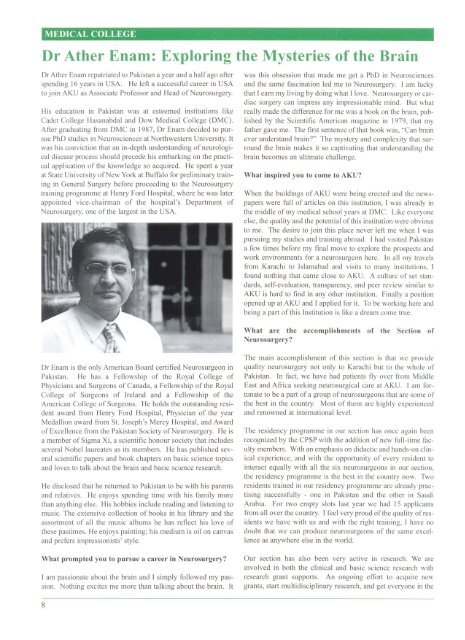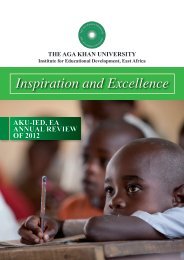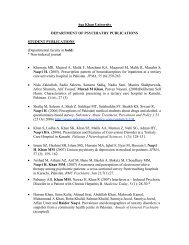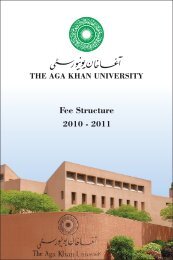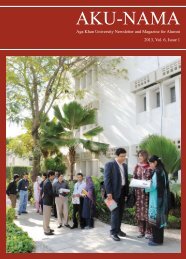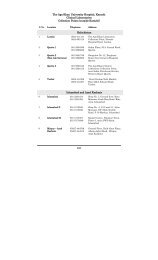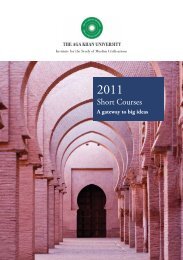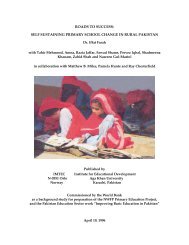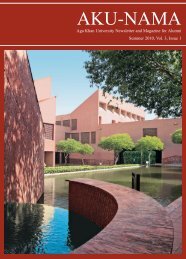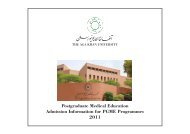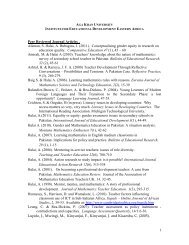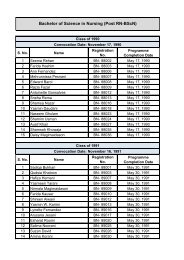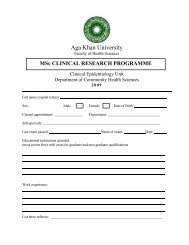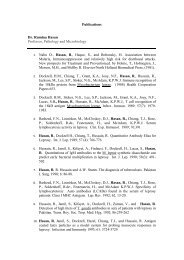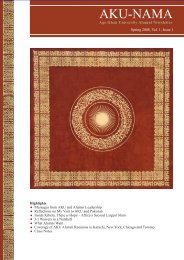Dr Ather Enam: Exploring the Mysteries of the Brain
Dr Ather Enam: Exploring the Mysteries of the Brain
Dr Ather Enam: Exploring the Mysteries of the Brain
You also want an ePaper? Increase the reach of your titles
YUMPU automatically turns print PDFs into web optimized ePapers that Google loves.
MEDICAL COLLEGE ', ', ' ". .<br />
<strong>Dr</strong> <strong>A<strong>the</strong>r</strong> <strong>Enam</strong>: <strong>Exploring</strong> <strong>the</strong> <strong>Mysteries</strong> <strong>of</strong> <strong>the</strong> <strong>Brain</strong><br />
<strong>Dr</strong> <strong>A<strong>the</strong>r</strong> <strong>Enam</strong> repatriated to Pakistan a year and a halfago after<br />
spending 16 years in USA . He left a successful career in USA<br />
to join AK U as Associate Pr<strong>of</strong>esso r and Hea d <strong>of</strong> Neurosurge ry.<br />
His education in Pakistan was at esteemed institutions like<br />
Cadet College Hasanabdal and Dow Medical Co llege (DMC).<br />
After grad uating from DMC in 1987, <strong>Dr</strong> <strong>Enam</strong> decided to pursue<br />
PhD studies in Neurosciences at No rthwestern University. It<br />
was his conv ictio n that an in-depth und erstanding <strong>of</strong> neurological<br />
disease process sho uld precede his emba rking on <strong>the</strong> practical<br />
application <strong>of</strong> <strong>the</strong> knowledge so acquired. He spent a yea r<br />
at State University <strong>of</strong>New York at Buffalo for preliminary training<br />
in Genera l Surgery before proceedin g to <strong>the</strong> Neuros urgery<br />
training programme at Henry Ford Hospital, where he was later<br />
appointed vice-chairman <strong>of</strong> <strong>the</strong> hospi tal' s Departme nt <strong>of</strong><br />
Neurosurgery, one <strong>of</strong> <strong>the</strong> largest in <strong>the</strong> USA .<br />
was this obsession that made me get a PhD in Neurosc iences<br />
and <strong>the</strong> same fasc ination led me to Neurosurgery. I am lucky<br />
that I earn my living by doing what I love. Neurosurgery or cardiac<br />
surgery can impr ess any impressionable mind. But what<br />
rea lly made <strong>the</strong> difference for me was a book on <strong>the</strong> brain, published<br />
by <strong>the</strong> Scie ntific Ame rican magazine in 1979, that my<br />
fa<strong>the</strong>r gave me. The first sentence <strong>of</strong>that book was, "Can brain<br />
ever understand brai n" The mystery and compl exity that surround<br />
<strong>the</strong> brain makes it so captivating that understandin g <strong>the</strong><br />
brain becomes an ultim ate cha llenge .<br />
What inspired you to come to AKU<br />
When <strong>the</strong> buildi ngs <strong>of</strong> AKU were being erected and <strong>the</strong> newspapers<br />
were full <strong>of</strong> articles on this institution, I was already in<br />
<strong>the</strong> middl e <strong>of</strong> my medical school years at DMC. Like every one<br />
else, <strong>the</strong> quality and <strong>the</strong> potential <strong>of</strong>this institution were obvious<br />
to me. The desire to join this place never left me when I was<br />
pursuing my studies and trainin g abroad. I had visited Pakistan<br />
a few time s before my final move to exp lore <strong>the</strong> prospects and<br />
work environments for a neurosurgeon here. In all my travels<br />
from Karachi to Islamabad and visits to many institutions, I<br />
found nothin g that came close to AKU . A culture <strong>of</strong> set standard<br />
s, self-eva luation, transparen cy, and peer review similar to<br />
AKU is hard to find in any o<strong>the</strong>r institution. Finally a position<br />
opened up at AKU and I applied for it. To be working here and<br />
being a part <strong>of</strong> this Institution is like a drea m come true.<br />
What are <strong>the</strong> accom plishm ent s <strong>of</strong> <strong>the</strong> Section <strong>of</strong><br />
Neurosurgery<br />
<strong>Dr</strong> <strong>Enam</strong> is <strong>the</strong> on ly Amer ican Board cert ified Ne uros urgeo n in<br />
Pakistan. He has a Fellowship <strong>of</strong> <strong>the</strong> Roya l Co llege <strong>of</strong><br />
Physicians and Surgeons <strong>of</strong> Canada, a Fellowship <strong>of</strong> <strong>the</strong> Royal<br />
Co llege <strong>of</strong> Surgeons <strong>of</strong> Ireland and a Fellowship <strong>of</strong> <strong>the</strong><br />
American Co llege <strong>of</strong> Surgeons. He holds <strong>the</strong> outstanding resident<br />
award from Henry Ford Hosp ital, Physician <strong>of</strong> <strong>the</strong> year<br />
Medallion award from St. Joseph's Mercy Hospital, and Award<br />
<strong>of</strong> Excellence from <strong>the</strong> Pakistan Society <strong>of</strong>Neurosurgery. He is<br />
a member <strong>of</strong> Sigma Xi, a scie ntific honour soc iety that includ es<br />
several Nobel laureates as its members. He has published severa<br />
l scientific papers and boo k chapters on basic science topic s<br />
and loves to talk about <strong>the</strong> brain and basic scie nce research.<br />
He disclosed that he returne d to Pakistan to be with his parents<br />
and relatives. He enjoys spending time with his famil y more<br />
than anything else. His hobbies includ e reading and listenin g to<br />
music . The extensive co llection <strong>of</strong> books in his library and <strong>the</strong><br />
assortment <strong>of</strong> all <strong>the</strong> music albums he has reflect his love <strong>of</strong><br />
<strong>the</strong>se pastimes. He enjoys painting; his medium is oil on canvas<br />
and prefers impressionists' style.<br />
What prompted you to pursue a career in Neurosurgery<br />
I am passio nate about <strong>the</strong> brai n and I simp ly followe d my passion<br />
. Not hing excites me more than talking about <strong>the</strong> bra in. It<br />
The main acco mplishment <strong>of</strong> this sect ion is that we prov ide<br />
quality neurosurgery not only to Karachi but to <strong>the</strong> whole <strong>of</strong><br />
Pakistan . In fact, we have had patie nts fly over from Middle<br />
East and Africa seek ing neurosurgical care at AKU . I am fortunate<br />
to be a part <strong>of</strong>a gro up <strong>of</strong> neurosurgeons that are some <strong>of</strong><br />
<strong>the</strong> best in <strong>the</strong> country. Most <strong>of</strong> <strong>the</strong>m are highl y experienced<br />
and renown ed at internatio nal level.<br />
The residency programme in our section has once again been<br />
recog nized by <strong>the</strong> CPSP with <strong>the</strong> add ition <strong>of</strong> new full-time faculty<br />
members. With an emphas is on didactic and hand s-on clinical<br />
experience, and with <strong>the</strong> opportunity <strong>of</strong> eve ry resident to<br />
interac t equally with all <strong>the</strong> six neurosurgeons in our section,<br />
<strong>the</strong> residency programme is <strong>the</strong> best in <strong>the</strong> country now. Two<br />
resi dents trained in our residency programm e are already practising<br />
successfully - one in Pakistan and <strong>the</strong> o<strong>the</strong>r in Saudi<br />
Arabia. For two empty slots last year we had 15 applicants<br />
from all ove r <strong>the</strong> country. I fee l very proud <strong>of</strong><strong>the</strong> quality <strong>of</strong>residents<br />
we have with us and with <strong>the</strong> right traini ng, I have no<br />
doubt that we can produce neurosurgeons <strong>of</strong> <strong>the</strong> same excellence<br />
as anyw here else in <strong>the</strong> world.<br />
Our section has also been very active in resea rch. We are<br />
involved in both <strong>the</strong> clinical and basic science researc h with<br />
research grant supports. An ongoing effo rt to acquire new<br />
gra nts, start mul tidisciplinary research, and get everyone in <strong>the</strong><br />
8
, ' , , I , ' UNIVERSITY<br />
section involved in research activity will bear fruits soon. The<br />
growth in <strong>the</strong> clinical practice in our section has also been phenomenal.<br />
Last year, we demonstrated a growth <strong>of</strong> 30 per cent<br />
in surgical cases, surpassing <strong>the</strong> goals for 2008 by 6 per cent.<br />
We see con tinued growth this year as well. The credit for this<br />
growth goe s to an increase in <strong>the</strong> number <strong>of</strong> neurosurgeons<br />
with independent priv ileges and "full" involvement <strong>of</strong>our nonfull-time<br />
faculty in <strong>the</strong> section.<br />
Research is an integral part <strong>of</strong> <strong>the</strong> University's focus. W hat<br />
research projects has your team undertaken<br />
I fully app reciate <strong>the</strong> University's focus. Clinical practice<br />
without research is sterile and degenerates over time. We<br />
are focusing both on <strong>the</strong> clinical and laboratory research<br />
with a vision to move into translational research. Among<br />
<strong>the</strong> clinical areas our interests include neuro-oncology, CNS<br />
tub erculosis and oth er infections, and head injuries. In<br />
neuro-on col ogy we are joining hands with several o<strong>the</strong>r<br />
investigators at AKU, as well as some outside AKU, to prepare<br />
a multi-centre database and set up a national brain<br />
tumour biorepository. We are collaborating with <strong>the</strong><br />
Eme rge ncy Medicine physicians to ga<strong>the</strong>r similar data on<br />
head injury.<br />
In <strong>the</strong> wet lab , our ongoing projects inc lude neural stem cell<br />
tran splantation. Research grant application to study <strong>the</strong> brain<br />
tumour stem cell s has also been submitted and techniques are<br />
being con sidered to harvest stem cell s from adu lt brain .<br />
What are <strong>the</strong> future plans <strong>of</strong> your section<br />
This section needs to expand fur<strong>the</strong>r and bring in sub-specialisation<br />
with faculty members devoted to <strong>the</strong>ir areas <strong>of</strong> interest. With<br />
adequate support from <strong>the</strong> University for each faculty member to<br />
grow in <strong>the</strong>ir clinical and research areas, we will be able to put<br />
AKU Neurosurgery Section on <strong>the</strong> map, at least as far as Asia is<br />
concerned. Eventually, we have to move towards an Institute <strong>of</strong><br />
Neuroscience. I was involved in <strong>the</strong> Institutes <strong>of</strong> Neuroscience<br />
as <strong>the</strong>y were developed at Northwestern University and <strong>the</strong>n at<br />
Henry Ford Hospital. I also visited world-class neuroscience<br />
institutes , such as Montreal Neurological Institute, to study how<br />
<strong>the</strong>y were initiated and what made <strong>the</strong>m so successful. A successful<br />
model <strong>of</strong> <strong>the</strong> Institute for Neuroscience has three main<br />
pillars: Neurology, Neurosurgery, and Research , with<br />
Neuroradiology and Psychiatry being major contributors to <strong>the</strong><br />
three. A second tier support comes from rehabilitation , and o<strong>the</strong>r<br />
services such as ophthalmology and ENT.<br />
There is a void in this arena in Pakistan and we need to develop<br />
an institute <strong>of</strong>Neuroscience here that has a regional reputation in<br />
South- East Asia and can serve <strong>the</strong> patient popu lation in <strong>the</strong><br />
Middle East as well. This was one <strong>of</strong> <strong>the</strong> few reasons that<br />
brought me back to Pakistan .•<br />
Examination Board - A Commitment to Quality Education in Pakistan<br />
Con /do fro m page I<br />
The Board has <strong>the</strong> general objective <strong>of</strong> designing and <strong>of</strong>fering<br />
high quality public examinations in English and Urdu based on<br />
<strong>the</strong> national curr iculum for secondary and higher secondary education.<br />
It will also arrange for training <strong>of</strong> teachers, and for<br />
appropriate learning materials to prepare teachers and students<br />
for <strong>the</strong> new examination system. It is intended to serve as a<br />
model <strong>of</strong> internationally recognised good practice in order to<br />
enhance <strong>the</strong> country's capacity<br />
for educational assessment and<br />
tests, and <strong>the</strong>refore to improve<br />
<strong>the</strong> quality <strong>of</strong> education in<br />
schools, and through <strong>the</strong>m, <strong>the</strong><br />
quality <strong>of</strong> education in <strong>the</strong><br />
national universities. From its<br />
first examination onwards,<br />
AKU-EB intends to serve a<br />
cross section <strong>of</strong> English and<br />
Urdu medium schools. AKU-<br />
EB is <strong>the</strong> first board in Pakistan to make <strong>the</strong> national curriculum<br />
syllabuses available to Urdu speaking teachers. Syllabi for all<br />
subjects are derived from <strong>the</strong> government-approved national<br />
curriculum.<br />
received more than 200 applications for affiliation from various<br />
school systems for its first examination <strong>of</strong>SSC schedule in April<br />
2006. From <strong>the</strong>se, over 100 schoo ls in all four provinces were<br />
given affiliation .<br />
AKU-EB will use <strong>the</strong> system <strong>of</strong>e-marking f or assessing<br />
<strong>the</strong> answer scripts <strong>of</strong> candidates in <strong>the</strong> examinations.<br />
This marking sys tem will be a new addition in <strong>the</strong> history<br />
<strong>of</strong>public examinations in <strong>the</strong> region, eliminating<br />
<strong>the</strong> possibilities <strong>of</strong>tampering with candidates ' results.<br />
AKU-EB was envisaged as a small undertaking which would be<br />
able to serve as a role model for o<strong>the</strong>r examination boards. The<br />
Board focuses on a targeted<br />
number <strong>of</strong> 27,000 candidates<br />
after a period <strong>of</strong> five<br />
years, which is just two per<br />
cent <strong>of</strong> <strong>the</strong> countrywide<br />
total <strong>of</strong> students sitting <strong>the</strong><br />
matri cul ate exa mination<br />
annually.<br />
The Board will use <strong>the</strong> system<br />
<strong>of</strong>e-rnarking for assessing<br />
<strong>the</strong> answer scripts <strong>of</strong> candidates in <strong>the</strong> examinations. This<br />
marking system will be a new addit ion in <strong>the</strong> history <strong>of</strong> public<br />
examinations in <strong>the</strong> region , eliminating <strong>the</strong> possibilities <strong>of</strong> tampering<br />
with candidates' results .<br />
Affiliation with AKU-E B is transparent and open for all <strong>the</strong> private<br />
school systems in Pakistan. In affiliating schools from <strong>the</strong><br />
private sectors, <strong>the</strong> emphasis is on school systems with well<br />
established in-service training facilities for teachers. The Board<br />
The Board is already collaborating with <strong>the</strong> Federal Board <strong>of</strong><br />
Intermediate and Secondary Education, and examination boards<br />
from across <strong>the</strong> country are approaching it for training to<br />
improve <strong>the</strong>ir own examination processes.•<br />
9


